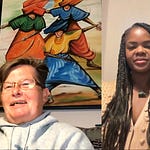Join me as I share my transformative experience of reconnecting with my dignity and self-worth amidst the challenges of life and internalized shame.
Wild Lion*esses Pride is a space for honest reflections and conversations that matter. Reflections on trauma healing, authenticity, and personal growth—grounded in mindfulness and self-compassion. If you connect with biographical essays that explore the complexity of identity and the journey toward wholeness, this space is for you. and would like to show your support, please consider becoming a valued patron for only $5 a month. Or a “Buy me a coffee” tip would be very generous. Thank you! 💚
![The image shows a definition of "shame" with the following text: shame [ʃeɪm] noun painful feeling of humiliation or distress caused by the consciousness of wrong or foolish behavior regrettable or unfortunate situation or action The background features bookshelves, and a blue wooden mannequin is seen in a thinking pose, adding to the reflection of the concept of shame. The image is branded with "Wild Lion*esses Pride" at the bottom. The image shows a definition of "shame" with the following text: shame [ʃeɪm] noun painful feeling of humiliation or distress caused by the consciousness of wrong or foolish behavior regrettable or unfortunate situation or action The background features bookshelves, and a blue wooden mannequin is seen in a thinking pose, adding to the reflection of the concept of shame. The image is branded with "Wild Lion*esses Pride" at the bottom.](https://substackcdn.com/image/fetch/w_1456,c_limit,f_auto,q_auto:good,fl_progressive:steep/https%3A%2F%2Fsubstack-post-media.s3.amazonaws.com%2Fpublic%2Fimages%2Fdff604cc-323f-4ca7-8794-025885a7ad88_1600x1200.heic)
In the first part of this essay, I reflected on my encounter with Gerald Hüther’s book ‘Würde’ and the unfolding journey of understanding dignity.
Exploring Dignity and Self-Care
What began as a reflection on dignity during October 2023 evolved into a deeper exploration of the concept of re-wilding my Self, as beautifully explained by
on InsightTimer. This new lens changed my perception and understanding of care, allowing the notion of "self-care" to emerge as a vital practice.In this context, Jon Kabat-Zinn's words resonated with newfound significance:
"No matter what the travails of life may have brought to the body and the mind, recognizing you are whole and complete right now, just as you are right in this moment. Embodied awareness, or what we call mindfulness, being a domain in which our limitations and our sorrows, our losses and our hurts, whatever they might be, are not confining or defining of our intrinsic beauty, our intrinsic worthiness, our intrinsic wholeness, our intrinsic belonging, and our interconnectedness with others, with nature, with the world. Nor do our personal challenges restrict our intrinsic capacity to be of use, to help others, to contribute to healing the ills of the world in ways that might seem tiny, but may in actuality be profoundly transformative in ways both little and big. And that may ultimately help heal the wounds of society and protect our planet, our world, and all life for generations yet to come."
–Jon Kabat Zinn Masterclass. Mindfulness and Meditation. The Body Scan.
Hearing this quote in the context of dignity and re-wilding shifted my perspective. It sparked a profound realization about what self-care truly meant. I understood this was about caring for myself — prioritizing my own needs and well-beinginstead of constantly catering to others.
This emerging concept of self-care became essential to my journey, allowing me to reconnect with my dignity and nurture the parts of myself long overlooked.
Understanding Toxic Shame and Its Impact
By January 2024, I realized I couldn't keep living the way I had.
I decided to take self-care seriously and stop neglecting myself. I stepped down from my role and went on sick leave. It felt counterintuitive, almost reckless.
Now I know I made a decision which has already transformed my life yet again.
In January 2021, at age 53, I had come out as non-binary after a quantum transformation. This time around, I still don't know where my journey is taking me.
My entire identity had revolved around functioning and proving my worth, but this choice honored a part of myself I hadn't ever accessed.
I wasn't sure what I would find, but I needed to create space to reconnect with this quiet dignity and Self I was beginning to feel. Yet it took another five months for me to understand why this connection had remained so elusive.
I progressed in therapy and coaching until, in May 2024, my coach recommended John Bradshaw's Healing the Shame that Binds You.
In reading John Bradshaw, I discovered toxic shame extends beyond the conventional understanding of shame Brené Brown often addresses.
While Brené Brown in her Atlas of the Heart identifies shame as a universal emotion that stems from feeling unworthy or not enough, toxic shame is a deeper, more insidious belief. It manifests as an internalized sense of being inherently flawed — unworthy of acceptance or love simply for who I am.
This belief binds itself to my identity, creating an ever-present feeling I must hide parts of myself or, worse, there's nothing worthwhile to show.
Brené Brown emphasizes healthy shame can serve as a guide, helping us recognize when we've done something wrong and prompting growth and empathy. In contrast, toxic shame distorts our self-image, leading to a pervasive sense of inadequacy stifling self-acceptance and self-expression. It convinces us our very being is flawed, leading us to conceal our true selves rather than embrace our inherent dignity.
Through John Bradshaw's work, I gained a profound understanding of the impact of toxic shame on my life. His insights illuminated why I felt so disconnected from my own self, revealing the invisible barrier long separating me from suppressed aspects of my identity.
While Gerald Hüther had planted the seed of my inherent worth, John Bradshaw's teachings helped me recognize toxic shame hindered the seed from flourishing. Toxic shame enveloped my sense of self, whispering dignity belonged to others — forever out of my reach. The self-respect and self-worth I yearned for had always existed, buried beneath years of survival habits and internalized narratives insisting I had to earn my place in the world.
Toxic Shame distorted my entire self-concept, convincing me the essence of who I am was flawed and undeserving, rendering me disconnected from the fullness of my identity and inherent dignity.
Through these understandings and subsequent self-reflections, two profound realizations emerged for me. The first was,
"I am an imposition and a disgrace."
This revelation, though uncomfortable, was crucial.
Recognizing toxic shame helped me realize my sense of emptiness wasn't due to an inherent flaw but rather a disconnection from my true self.
Reclaiming Dignity and Embracing Self-Worth
I had always believed worth and dignity were earned through performance, achievement, or pleasing others. In reality, they were always present, simply obscured by the protective strategies I'd developed to shield myself from feelings of inadequacy.
Another sobering truth emerged in the wake of these realizations:
"I have been unhappy for the most part of my life."
Gerald Hüther's concept of dignity, along with the deepening sense of wholeness Jon Kabat-Zinn describes as "completeness," further enriched my ongoing journey of development and healing, which I had been navigating for nearly four years by that point.
This inner anchor, unaffected by external judgments, served as my guide back to myself, illuminating my way through the fog of toxic shame.
John Bradshaw's insights into shame further clarified why this journey had felt obscured for so long, explaining why connecting with any aspect of my self-concept felt not just challenging but almost impossible.
This transformative understanding of dignity served as the foundation for reclaiming my identity.
The interplay between Hüther's and Bradshaw's insights highlighted the profound impact of toxic shame on our sense of self.
Brené Brown complements this by emphasizing the significance of self-acceptance in overcoming feelings of inadequacy.
Together, they convey our inherent worth does not rely on external validation but represents a birthright we can learn to recognize and embrace.
As I reflected on these concepts, I noticed a crucial distinction: while experts like Gerald Hüther, Brené Brown, and Kristin Neff address dignity and self-connection, they approach the topic from different angles without explicitly linking their ideas to toxic shame. Renowned scholars such as Peter Levine, Bessel van der Kolk, and Gabor Maté delve into trauma and its effects on the self, yet they don't actively connect their work to the concept of toxic shame.
Brené Brown explores vulnerability and belonging, and Kristin Neff emphasizes self-compassion, but these insights feel incomplete without acknowledging toxic shame's pervasive influence.
Recognizing this interconnectedness deepened my understanding of my own journey and the complexities surrounding the Self.
This disconnection profoundly affects all aspects of the self, including:
Self-Worth: The perception of inherent value.
I did not know what that was.Self-Compassion: The ability to treat oneself with kindness.
I learned it, one metta prayer at a time.Self-Identity: The fundamental sense of who one is.
I am just starting to get a true sense of it.Self-Expression: The capacity to convey thoughts and emotions.
I have spoken from my corrupted self for most of my life, pleasing people and trying to be seen, heard, and acknowledged. I have finally arrived there this fall.Self-Trust: Confidence in personal judgments and intuition.
I got in touch through embodiment practices.Self-Care: Habits for nurturing mental and physical well-being.
That was esential.
Self-Confidence: Faith in one's abilities and potential.
I have faked it for almost 57 years of my life; now I am starting to make it.Self-Acceptance: The willingness to embrace all aspects of oneself.
Each day I recite: May I love and accept myself as I am.Self-Boundaries: The limits established to protect needs, values, and my dignity, safeguarding identity and self-respect while fostering healthy relationships.
I had none. I am just now finding the boundaries between myself and others.
Toxic shame inhibits access to these aspects of self, obscuring them from our experience. While I grasped these self-concepts intellectually, they remained emotionally distant to me.
It wasn't until July 2024 I began to truly connect with them.
For most of my adult life, I couldn't genuinely feel any of these aspects; I merely feigned understanding and emotion.
By recognizing this connection between toxic shame and my disconnection from self, I realized my journey wasn't simply about "finding" dignity.
It involves actively challenging and releasing deeply ingrained messages of shame—messages that had buried my inherent sense of self. Releasing them finally allowed my true inner Self to emerge.
As of December 2024, a quiet sense of dignity remains elusive at times; it's an ongoing journey, yet I've noticed a profound shift.
I now view dignity as an ever-present possibility — an inner awareness anchored not in my productivity or others' opinions, but in something far more enduring. Even in moments when I feel disconnected from this awareness, I recognize I always have the choice to pause, be mindful, and center myself. By grounding my awareness, I can re-establish the connection with the self I once believed was lost. This steady presence, as Hüther eloquently puts it, "lifts you up."
After all this time, I'm beginning to understand what dignity truly is - not merely a concept or a reward, but a fundamental truth simply, quietly, mine.
As I continue to explore and integrate the insights from Hüther, Bradshaw, and others, I recognize the path to reclaiming my dignity involves embracing my intrinsic worth and releasing toxic shame keeping me disconnected from myself.
This journey isn't just about finding dignity; it's about cultivating a relationship with my true Self — one characterized by self-compassion, self-acceptance, self-love and the courage to express who I really am.
With each step forward, I honor the complexity of my experiences, understanding healing and growth unfold gradually.
I cherish the lessons learned along the way, knowing every moment spent reconnecting with my dignity and inner Self brings me closer to living a life authentic and whole.
❤️ If you find this piece meaningful, consider clicking the heart at the top or bottom of the post. It helps others discover this newsletter and brightens my day.














Share this post